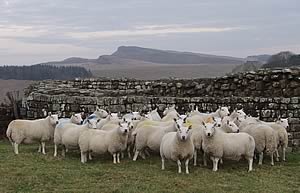 |
|||||||||
|
|||||||||||||||||||
|
|
Farmers
urged to be alert for Sheep Scab Farmers are being urged to be on high alert for sheep scab, as sheep that have been on lowland farms grazing over the winter begin to return home. The fear that this spring could see a resurgence of the disease has been confirmed by a survey of vets and animal health officers undertaken by the Scottish Sheep Scab Initiative, an all-industry group co-ordinated and founded by NFU Scotland.
The return of away-wintered sheep always represents a threat of sheep scab. These animals have been on a different farm, mixing with other flocks therefore increasing their exposure to potential disease which can be brought back to the home flock. The Initiative is calling for all farmers to assess the risks posed by returning sheep and to isolate them and treat for scab. The importance of this has been underlined by the results of a survey of vets and animal health officers across Scotland. Whilst praising the efforts of the Initiative in raising awareness and helping to reduce cases, it is clear from vets that scab remains a significant problem on the ground. The responses from 23 veterinary practices revealed that over 80 scab outbreaks were reported over the last year. Only five practices reported no outbreaks. The Scottish Sheep Scab Initiative is continuing to raise its concerns over the ban on cypermethrin sheep dip, which flies in the face of the work to tackle scab both by the industry and Scottish Executive. In particular, the banning of cypermethrin dip presents a real problem for organic producers since it was the only dip they were previously able to use. NFUS Livestock Committee Chairman is Nigel Miller, a farmer and qualified vet from the Borders. Nigel also chairs the Scottish Sheep Scab Initiative. He said: “Spring is always a dangerous season for sheep scab. However, the next two or three weeks is also an opportunity for farmers to deal with the potential threat facing their farms as away-wintered sheep head home. Returning animals need to be isolated and treated to avoid further outbreaks. “I’m proud of the work done by the Initiative in raising awareness of the importance of tackling scab and the stigma often attached to it. The survey revealed an almost unanimous view that the Initiative remains extremely important to the sheep industry. “Of course, our efforts and those of the Scottish Executive through its animal health strategy, have not been helped by the ridiculous decision imposed on Scotland to suspend the use of cypermethrin dips, on evidence which is non-existent in Scotland. As a group, we have written to the Veterinary Medicines Directorate asking for some common sense to prevail. The VMD should be there to help, not hinder, efforts to improve animal health.” Brian Hosie, Group Support Manager, SAC Veterinary Services advises sheep farmers to co-operate to tackle sheep scab: “At this time of the year, the effects of sheep scab are particularly severe. And, stock returning from away-wintering provide increased opportunities for the disease to spread. Animals at risk from sheep scab should receive the appropriate treatment.” • The Scottish Sheep Scab Initiative is an all-industry group chaired and co-ordinated by NFU Scotland. It comprises representatives of the farming sector, government, the veterinary profession, State Veterinary Service, organic sector, auction markets, sheep breed societies and pharmaceutical companies.
|
||||||||||||||||||

|
|
||||||||||||||||||
| home | agri-services | pedigree
pen | news | dairy | beef | machinery property | organisations | site map |
|||||||||||||||||||
